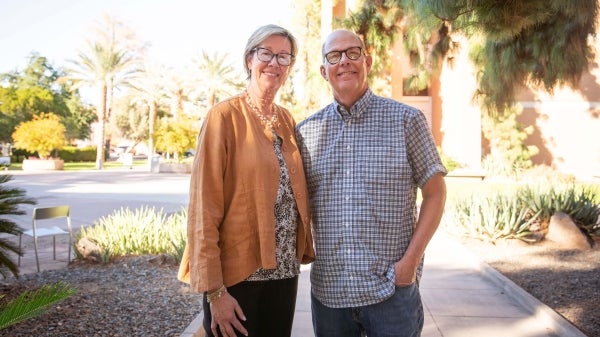ASU secures NSF grant to advance data science literacy as demand soars

Jennifer Broatch, associate director and professor at ASU’s School of Mathematical and Natural Sciences, explores key data concepts with students during a MAT class. Photo by Danielle Castillo/ASU
In an era where data permeates every facet of our lives, the importance of data literacy cannot be overstated. Recognizing this critical need, Jennifer Broatch, a professor at Arizona State University's School of Mathematical and Natural Sciences, has been awarded by the National Science Foundation a grant of $331,452 to enhance data science education for nonmajor students.
The three-year project, which began in fall 2024, focuses on identifying essential competencies for data science literacy and understanding student learning trajectories in introductory data science courses for a diverse, general audience. Given the increasing demand for data literacy across various professions, this initiative addresses a significant educational gap.
Broatch's research is significant because it highlights the intersection of statistics, computer science and mathematics in shaping data science education. The project not only addresses the demand for data-literate professionals but also bridges the gap between high school and college data science education. Given that 1 in 2 jobs today require some level of data analysis skills, projects like this are crucial in ensuring students are prepared for the evolving job market.
Through this NSF-funded initiative, Broatch continues to make significant contributions to the field of data science education, helping students develop the skills necessary to navigate a data-driven future.
We spoke with her about the significance of her work and its broader impact on education and workforce development.
Question: What question(s) are you hoping to answer with this project, and how are you finding those answers?
Answer: This project aims to serve the national interest by identifying the most crucial competencies for data science literacy. We also want to understand how students from non-data-intensive majors develop these skills in an introductory course. Our research involves analyzing different learning trajectories, assessing pedagogical choices and determining how best to support students in building essential data competencies.
Q: How does this work improve lives or make the world a better place?
A: The project is significant because it addresses the growing need for data literacy among students who are not majoring in data science, yet will benefit from the ability to interpret and use data in various aspects of their lives and careers. Data science literacy requires a combination of competencies, including statistical thinking, critical thinking, computational skills, data management, data visualization and ethical reasoning. However, it is challenging to cover all these skills in an introductory course. This project will investigate which competencies should be prioritized and carefully evaluate the pedagogical choices and learning trajectories that support the development of these skills for students who do not plan to pursue a degree with a heavy emphasis on data analysis. The broader significance of this project lies in its potential to advance data science education, making it more accessible and effective for students of all majors. This aligns with NSF's mission to promote the progress of science and enhance STEM education.
Q: What sets your work apart from others in this field?
A: This is cutting-edge work. We are collaborating with the Data Science 4 Everyone initiative, which advocates for K–12 data literacy. However, our project focuses specifically on the transition from high school to postsecondary education, ensuring that students entering college have the foundational data skills they need.
Q: How will students be involved in this project?
A: We are involving students as research assistants and also engaging educators in our study. They will engage in the educational research and play a critical role in the evaluation and identification of the data science competencies. By working with the broader education community, we hope to gain insights that will inform best practices for teaching data science to nonmajors.
Q: What is the timeline for this project? When can we expect updates?
A: The funding period began on Oct. 1, 2024, and the project will continue for three years. We have already been invited to publish our findings as a supplement to the Guidelines for Assessment and Instruction in Statistics Education website by the American Statistical Association. As we progress, we will share updates on findings and best practices for data science education.
More Science and technology

Alum's journey to leadership shows the power of lifelong learning
In 1976, Kathy King was among a minority when a high school teacher advised her to pursue chemical engineering at Arizona State University.“Mechanical and electrical engineering were popular, but I…

3 ASU faculty members earn highest honor for early-career scientists, engineers
Three faculty in The College of Liberal Arts and Sciences at Arizona State University have been awarded the Presidential Early Career Award for Scientists and Engineers, or PECASE, by former…

The Polytechnic School at ASU hits milestone mark at 10 years
The year was 2014.Taylor Swift released “1989.” "Frozen” and its soundtrack were stuck in the minds of many.Facebook was still the most popular social media site, and “Happy” by Pharrell…